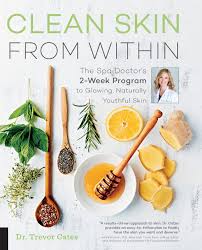Eating clean really is easier than you think and has so many benefits, including better skin. I find that there is often some confusion about what clean eating is and how to achieve it, though, which is why I want to take a moment to address how it can be easily achieved and what foods to look out for—both good and bad.
To start, clean eating is described as a dietary lifestyle that involves eating natural foods as much as possible and avoiding any processed or refined foods. When you try to focus on clean eating, you should be focusing on eating as many fresh, whole foods as possible. Eating clean has a lot of benefits and can greatly change your lifestyle. Many people notice that eating clean gives them more energy, contributes to weight loss and can even contribute to clearer skin and overall improvements to health. It’s no surprise that when you eat natural, whole foods, your body responds by working at optimal levels.
Below I’ve made a list of foods that should be avoided when eating clean as well as a list of a few foods that you should eat and why they have so many great benefits. These are foods that are often refined or processed and sold with additives that can have adverse side effects. When you eat clean you should be able to know all of the ingredients in the food you’re eating. This means that things with additives or artificial ingredients are out, so opt for the more natural alternatives where you can.
Start by avoiding these foods and drinks–listed in order of importance–as much as possible:
- Sugar
- Dairy
- Gluten-containing grains
- Alcohol
- Caffeine
- Eggs
- Corn
- Nightshades
- Peanuts
- Soy
Now, let’s focus on a few of the many things you CAN, and should, be eating when looking to achieve a clean eating lifestyle:
Avocados
Avocados are high in antioxidants such as polyphenols and vitamin E, which help combat oxidative damage that can accelerate skin aging. While Avocado is known for being high in fats, these are healthy fats that your body needs to contribute to healthy hair, skin and nails. Vitamin E, for example, is often found in products like lotions and balms to help heal wounds and lessen the appearance of scars because of its hydrating ability to fortify your skin.
Olives
Olives are a great source of monounsaturated fats and antioxidants. If you love olives, feel free to add an extra serving to your daily fruit intake. However, be aware that many olives are high in sodium, so you may want to drink more water if you eat olives to make sure that your body isn’t retaining water.
Papaya
Papayas are rich in vitamins A and C and contain potassium, folate, fiber, and other skin-enhancing nutrients. They also naturally contain the enzyme papain, which can help us digest food. These tropical fruits look like a cross between a banana and a melon and can be found in most grocery stores. They also make great additives to things like smoothies and salads as they have a very light flavor and contain a lot of water.
Coconut
Enjoy the whole coconut. There are benefits from the water, milk, meat, and oil this precious plant produces. Coconut contains lauric acid, which is full of immune-enhancing properties that are great for skin health. You can also get a lot of benefits from different coconut products, as long as those products are naturally processed and don’t contain any extra chemicals, sugars or ingredients. Enjoy things like toasted coconut chips, coconut water or even use coconut oil in your cooking instead of olive oil.
There’s so much more that I’d love to tell you about legumes, fermented foods, oils, berries, and clean animal proteins. In fact, that’s one of the reasons I wrote the book, Clean Skin Within. If you haven’t accessed my book, which is also a 2-week program to glowing, naturally, youthful skin, then do it now! It’s FREE. All you pay is shipping.
Eat clean and enjoy better skin and health. You can do this!

